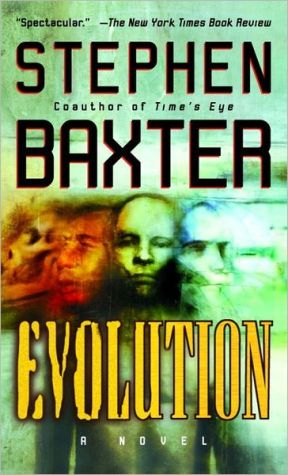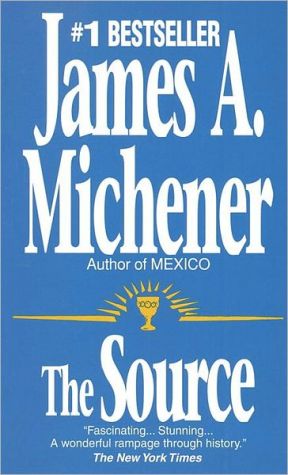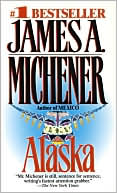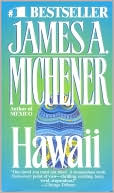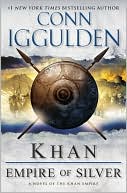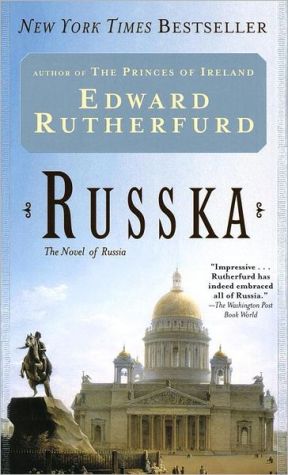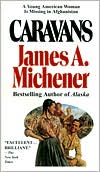Evolution
Stretching from the distant past into the remote future, from primordial Earth to the stars, Evolution is a soaring symphony of struggle, extinction, and survival; a dazzling epic that combines a dozen scientific disciplines and a cast of unforgettable characters to convey the grand drama of evolution in all its awesome majesty and rigorous beauty. Sixty-five million years ago, when dinosaurs ruled the Earth, there lived a small mammal, a proto-primate of the species Purgatorius. From this...
Search in google:
Stretching from the distant past into the remote future, from primordial Earth to the stars, Evolution is a soaring symphony of struggle, extinction, and survival; a dazzling epic that combines a dozen scientific disciplines and a cast of unforgettable characters to convey the grand drama of evolution in all its awesome majesty and rigorous beauty. Sixty-five million years ago, when dinosaurs ruled the Earth, there lived a small mammal, a proto-primate of the species Purgatorius. From this humble beginning, Baxter traces the human lineage forward through time. The adventure that unfolds is a gripping odyssey governed by chance and competition, a perilous journey to an uncertain destination along a route beset by sudden and catastrophic upheavals. It is a route that ends, for most species, in stagnation or extinction. Why should humanity escape this fate?The New York TimesEvolution, by Stephen Baxter, is a work of outrageous ambition. Baxter's goal is nothing less than to dramatize the grand sweep of primate development, beginning with a rodentlike Eve scrabbling for survival in the dinosaur-dominated forests of North America 65 million years ago and extending to an imaginary whimper some 500 million years in the future. To say that Baxter's reach exceeds his grasp is to state the obvious. What is astonishing is how successfully he brings to life a wide range of facts and conjectures, and how entertaining as well as informative this book -- an episodic novel with evolution as its protagonist -- manages to be. — Gerald Jones
dinosaur dreams\ Montana, North America. Circa 65 million years before present.\ I\ At the edge of the clearing, Purga crept out of a dense patch of ferns. It was night, but there was plenty of light--not from the Moon, but from the comet whose spectacular tail spread across the cloudless sky, washing out all but the brightest stars.\ This scrap of forest lay in a broad, shallow lowland between new volcanic mountains to the west--the mountains that would become the Rockies--and the Appalachian plains to the east. Tonight the damp air was clear; but often mists and fogs blew in from the south, born over the great inland sea that still pushed deep into the heart of North America. The forest was dominated by plants that could extract moisture from the air: Lichen coated the gnarled bark of the araucaria trees, and even the low magnolia shrubs dripped with moss. It was as if the forest had been coated with a layer of thick green paint.\ But everywhere the leaves were soured, the moss and ground cover ferns browned. The rains, poisoned by gases from the great volcanic convulsion to the west, had been hard on plants and animals alike. It wasn't a healthy time.\ Still, in the clearing, dinosaurs dreamed.\ The thick night dew glistening from their yellow-black armor, ankylosaurs had gathered in a defensive circle, their young at the center. In the gentle Cretaceous air, these cold-blooded giants stood like parked tanks.\ In the milky light Purga's large black eyes had fixed on a moth. The insect sat on a leaf, brown wings folded, fat and complacent. With an efficient lunge Purga caught her prey in her paws. She severed off the wings with a couple of nips of her tiny incisors. Then, with a noise like the crunch of a tiny apple, she began to munch with relish at the moth's abdomen. For this brief moment, with food in her mouth, Purga found a scrap of contentment in her crowded, difficult life.\ The moth quickly died, its sparklike awareness incapable of recording much pain.\ The moth consumed, Purga moved on. There was no grass cover here--the grasses had yet to dominate the land--but there was a green covering of low ferns, mosses, ground pine, horsetails, and conifer seedlings, even a few gaudy purple flowers. Through this tangle, scuttling between scraps of cover, she was able to progress almost silently. In the dark, solitary foraging was the best strategy. Predators worked by ambush, exploiting the shadows of the night; no group could have been as invisible as a lone prowler. And so Purga worked alone.\ To Purga the world was a plain picked out in black, white, and blue, lit up by the uneasy light of the comet, which shone behind high scattered clouds. Her huge eyes were not as sensitive to color as the best dinosaur designs--some raptors could make out colors beyond anything that would be visible to humans, somber infrareds and sparkling ultraviolets--but Purga's vision worked well in the low light of night. And besides she had her whiskers, which fanned out before her like a tactile radar sweep.\ Purga looked more rodentlike than primate, with whiskers, a pointed snout, and small folded-back ears. She was about the size of a small bush baby. On the ground she walked on all fours, and she carried her long bushy tail behind her, like a squirrel. To human eyes she would have seemed strange, almost reptilian in her stillness and watchfulness, perhaps incomplete.\ But, as Joan Useb would one day learn, she was indeed a primate, a progenitor of that great class of animals. Through her brief life flowed a molecular river with its source in the deepest past, its destination the sea of the furthest future. And from that river of genes, widening and modifying as thousands of millennia passed, would one day emerge all of humanity: Every human ever born would be descended from the children of Purga.\ She knew none of this. She didn't give herself a name. She was not conscious like a human--or even like a chimp or monkey; her mind was more like a rat's or a pigeon's. Her behavior was made up of fixed patterns, controlled by innate drives that constantly shifted in balance and priority, reaching a new sum each moment. She was like a tiny robot. She had no sense of self.\ And yet she was aware. She knew pleasure--the pleasure of a full belly, the safety of her burrow, the snouts of her pups as they nuzzled her belly for milk--and, in this dangerous world, she knew fear very well.\ She crept among the feet of dreaming ankylosaurs. As she moved beneath the immense bellies Purga could hear the huge rumble of the dinosaurs' endless digestion, and the air was thick with their noxious farts. With their crude teeth, all the work of processing and digesting their coarse food had to be done in the dinosaurs' vast guts, which labored even as the ankylosaurs slept.\ The ankylosaurs were herbivorous dinosaurs. But this was a time of huge, ferocious predators. So these animals, larger than African elephants, were covered with armor, a fusion of bones, ribs, and vertebrae. Great yellow-black spines were embedded in their backs. Their skulls were so heavily reinforced there was little room left for brain. Their tails ended in heavy clubs that could smash legs or skulls.\ The dinosaurs were too huge for Purga to comprehend. Hers was a small world, where a fallen log or a puddle was a major obstacle, where a scorpion could be a significant predator, where a fat millipede was a rare treat. To her, the dozing ankylosaur herd was a forest of immense stumpy legs and drooping tails that had no connection to each other.\ But for Purga there was a rich prize here: dinosaur dung, immense heaps of it scattered in the muddy, trampled ground. Here, in fibrous mountains of roughly digested vegetation, she might find insects, even dung beetles, laboring to destroy the tremendous turds. She burrowed into the steaming stuff eagerly.\ Thus had been the role of the ancestors of humanity, all through the long dinosaur summer: relegated to the fringe of the reptiles' great society, emerging from their burrows only at night, foraging for a living from dung, insects, and the small pickings of the forest.\ But tonight the rewards were meager, the droppings watery and foul-smelling. The volcano-damaged vegetation had provided poor fodder for the ankylosaurs, and what came out the other end was of little value to Purga.\ She moved across the clearing and into the forest. Here conifers towered grandly, rising to spreading mats of leaves far overhead. Among them were smaller trees a little like palms, and a few low bushes bearing pale yellow flowers.\ Purga scrambled briskly into the angular branches of a ginkgo tree. As she climbed she used the scent glands in her crotch to mark the tree. In her world of night, scent and sound were more important than sight, and if others of her kind found this mark, any time within the next week, it would be a sign like a neon light, telling them she had been here, even how long ago she had passed.\ It was pleasing to climb, to feel her muscles work smoothly as they hauled her high above the dangerous ground, to use the delicate balance afforded by her long tail--and, most of all, to jump, to fly briefly from one branch to another, using all her body's equipment, her balance, her agility, her grasping hands, her fine eyes. She was forced to shelter in burrows on the ground. But everything about her had been shaped by an existence in the complex three-dimensional environment of the trees, where almost all primate species, throughout the family's long history, would find refuge.\ But the acid rain of recent months had withered the trees and undergrowth; the bark was sour, and there were few insects to be found.\ Purga was perpetually hungry. She needed to consume her body weight every day: It was the price of her warm blood, and the milk she must produce for her two pups, safe in their burrow deeper in the forest. She clambered reluctantly back down the trunk of the ginkgo. Fear and hunger warring in her mind, she tried one or two more trees, but with no better luck.\ But now she lifted her head, whiskers twitching, bright eyes wide, to peer into the green dark of the forest. She could smell meat: the alluring stench of broken flesh. And she heard a forlorn, helpless piping, like that of baby birds.\ She scuttled away, following the scent.\ In a small clearing at the base of a huge, gnarly araucaria there was a heap of roughly piled moss. At its edge, a small patch of debris-littered silt began to move. Soon the patch rose like a lid, and a small, scrawny neck poked out of the ground and through the layer of mud and debris. A beaklike mouth opened wide.\ Its little head quivering, tiny scales and feathers still moist with yolk, the infant dinosaur took its first breath. It looked like an oversized baby bird.\ It was the moment the didelphodon had been waiting for. This mammal, the size of a domestic cat, was one of the largest of its day. It was low slung, with a black-and-silver coat. Now it lunged forward and grabbed the chick by its thin neck, hauling it from its shell and flinging it into the air.\ The chick's life was a handful of brief, vivid impressions: the cold air beyond its cracked shell, the blurred glow of the comet, a sense of flying. But now a hot cavern opened beneath it. Its skin still smeared with yolk, the chick died instantly.\ Meanwhile more chicks were pushing out of the ground, hatching all at the same time. It was as if the ground were suddenly swarming with baby dinosaurs. The didelphodon, and more predatory mammals, closed in to feed.\ An ancient survival strategy had been operating. Dinosaurs were reptiles who laid their eggs on the ground. Though some parents stayed with their brood, there was no way all the vulnerable eggs and chicks could be protected. So dinosaurs laid many eggs, and their hatchings were synchronized. There should have been dozens of broods hatching right now, scattered through this area of forest: hundreds of chicks. The idea was that suddenly the forest floor would be overwhelmed with baby dinosaurs, far too many for even the hungriest of predators. Most of the chicks would die, but that didn't matter. It was enough that some would survive.\ But here, tonight, the strategy had gone wrong--horribly so for the dinosaur chicks. The mother of these chicks was a hunter isolated from her pack. Confused, hungry, scared of predation herself, she had laid her eggs in the old, familiar place--this rookery was millennia old--and covered them with rotting vegetation for warmth. She had done just what she should have done, save that it was the wrong time, and the eggs had been forced to hatch without the cover of hundreds of others.\ The air was filled with the stink of blood, the low growls of the predators, and the sad peeping of the doomed chicks. There were many species of mammals represented here at this grisly banquet. The largest was the big didelphodon. There was a pair of deltatheridiums, ratlike omnivores, neither marsupial nor placental, a unique line that would not outlive the dinosaurs. Many of the creatures here had potential far beyond their present standing; one unprepossessing little creature was an ancestor of the line that would lead to the elephants.\ But for now, all that concerned them was their empty bellies. Dissatisfied with the slow emergence of the struggling hatchlings, the mammals had already started to dig into the loose silt, seeking unbroken eggs, scattering the cover of moss laid over the nest by the mother dinosaur.\ By the time Purga arrived the rookery had become a killing pit, a squirming mass of feeding mammalian bodies. Purga, late to the fray, burrowed eagerly into the dirt. Soon tiny bones crunched in her mouth. And, so deeply did she immerse her head in search of the deep-buried goodies, she was the last to sense the return of the mother dinosaur.\ She heard an angry bellow, felt the ground shudder.\ Her snout sticky with yolk, Purga pulled her head out of the dirt. The other mammals were already vanishing into the forest's welcoming green black. For one instant Purga saw the whole creature, an unlikely feathered monster suspended in the air, limbs splayed, mouth gaping. Then a vast clawed hand flashed out of the sky.\ Purga hissed and rolled. Too late she learned that this was the nest of a troodon: an agile, fast-moving killer--and a specialist hunter of mammals.\ The troodon's name meant "Wounding Tooth."\ Wounding Tooth, the size of a dog, was not the largest of dinosaurs, but she was intelligent and agile. Her brain compared in size to that of the flightless birds of later eras she somewhat resembled. Her eyes were as large and as well night-adapted as Purga's, and they could see forward, giving her binocular vision, the better to triangulate on her small, fast-moving targets. She had legs that enabled her to spring like a kangaroo, a long sicklelike claw on the second toe of each foot, and hands like spades evolved specifically to dig out and crush scuttling mammals.\ She was coated in small sleek feathers, an elaborate development of scales. The feathers weren't meant for flying, but for warmth during the night's chill. In the equable climate that swathed the Earth in these times, you didn't need a hot-blooded metabolic engine to keep warm: If you were big enough, your cold-blooded body would retain its heat right through the night, even if you lived at Earth's extremes, at the poles. But smaller dinosaurs, like the troodon, needed a little extra insulation.\ Small or not, she had one of the largest brains of all dinosaurs. All in all, she was a well-equipped hunter. But Wounding Tooth had problems of her own.\ She could not know it, but they had been caused by the widening of the Atlantic, the huge geological event that had dominated the whole of this Cretaceous period. As the Americas were pushed west, North America's huge inland seaway had shallowed and drained, and close to the western coast--just a few hundred kilometers from the troodon's hatching site--that line of new volcanoes had erupted like an angry wound. The volcanism had disturbed the complex web of life in many ways. The young volcanoes were almost continually active, belching out smoke and ash ladened with sulfur that, mixing with the rain, turned to acid. Many species of plants had vanished, and trees on the higher ground had been reduced to bare trunks. Elsewhere the destruction had been more direct, with vast fingers of cold lava reaching deep into the forest.\ From the Hardcover edition.
\ From Barnes & NobleThe Barnes & Noble Review\ It's 2031, and human-induced climate change is wreaking havoc on the earth and all its inhabitants. Mass extinction of species is occurring at a record pace. Major coastal cities are completely flooded; tens of millions of people are displaced. Civilization is crumbling. In large part due to the actions of humankind, the depleted and polluted earth is dying -- along with almost every organism that lives on it. The brightest scientists from around the world gather at an ecological conference to try and figure out a way to stop the imminent extinction event. Paleontologist Joan Useb has the answer, but it may already be too late. \ With Useb's story as a loose framework for this epic Darwinian drama, Baxter goes back 65 million years to the Cretaceous period, when the ancestors of humankind were small, nocturnal, rodentlike creatures living in fear of predatory dinosaurs. Every million years or so, Baxter revisits the descendants of those early primates and follows the slow evolution of humankind from squirrel-like tree dwellers to tool-making hominids to the very first agriculturists. Then Baxter goes episodically 500 million years into the future. What humankind eventually evolves into is both tragic and, in an odd way, triumphant.\ There are good books, there are great books, and there are Significant books -- profoundly powerful works that actually change the way a reader looks at the world. Stephen Baxter's Evolution is one of those rare novels that will touch readers on a much deeper, more permanent -- I daresay spiritual -- level. It's disturbing, depressing, chilling, and, in the end, compelling. Like Kim Stanley Robinson's The Years of Rice and Salt and Baxter's own Manifold trilogy (Manifold Time, Manifold Space, and Manifold Origin), Evolution examines where humans came from and what we could possibly evolve into. Ambitious, apocalyptic, and awe-inspiring, Evolution is a must-read if there ever was one. Paul Goat Allen\ \ \ \ \ \ The New York TimesEvolution, by Stephen Baxter, is a work of outrageous ambition. Baxter's goal is nothing less than to dramatize the grand sweep of primate development, beginning with a rodentlike Eve scrabbling for survival in the dinosaur-dominated forests of North America 65 million years ago and extending to an imaginary whimper some 500 million years in the future. To say that Baxter's reach exceeds his grasp is to state the obvious. What is astonishing is how successfully he brings to life a wide range of facts and conjectures, and how entertaining as well as informative this book -- an episodic novel with evolution as its protagonist -- manages to be. — Gerald Jones\ \ \ Publishers WeeklyTaking a page from SF saga writers like Kim Stanley Robinson and Brian Stableford, British author Baxter (the Manifold trilogy) portrays humanity's origins, growth and ultimate disappearance in a loose-knit series of brutal vignettes spanning millions of years of evolution. Beginning with the gritty slice-of-life tale of a small, ratlike proto-primate called Purga (short for species Purgatorius), the story travels from the end of the Cretaceous through the millennia as primates slowly evolve into creatures more and more recognizably human, learning to make and use tools, developing language and the ability to feel empathy-the trait that Baxter selects as definitive of true humanity. Resonating with that theme, the vignettes are linked by a thin near-future frame about scientists meeting in the midst of ecological and political chaos to find a way to save humanity from itself through the "globalization of empathy." More concerned with technical detail than character or plot, the book rises above its fragmented narrative and frequently repetitive violence to reach a grim and stoic grandeur, which (despite a tendency toward preachiness) clearly has humanity's best interests at heart. Here is a rigorously constructed hard SF novel where the question is not whether humanity will reach the stars but how it will survive its own worst tendencies. (Feb.) Copyright 2003 Cahners Business Information.\ \ \ \ \ Library JournalAs a group of scientists gathers in the South Pacific for a conference to save the human race from extinction, their actions represent the culmination of millions of years of struggle by their primate ancestors to survive in an ever-changing world. The author of the Manifold trilogy (Manifold: Time; Manifold: Space; Manifold: Origin) uses a modern-day story as a frame within which he relates a series of vignettes tracing the history of the evolution of intelligent life on Earth, from its mammalian beginnings in the Cretaceous era to the present. Spanning more than 165 million years and encompassing the entire planet, Baxter's ambitious saga provides both an exercise in painless paleontology and superb storytelling. Highly recommended for sf as well as general fiction collections. Copyright 2003 Reed Business Information.\ \ \ \ \ Kirkus ReviewsBulky assemblage-it's a stretch to call this a novel-of animated dioramas endeavoring to illustrate the story of primate evolution. The token frame here concerns the journey of two friends, paleontologist Joan Useb and primatologist Alyce Sigurdardottir, to attend a conference in Darwin, Australia, in 2031. The planet's ecology and climate are threatened, the huge volcano on nearby Rabaul is close to exploding-and to cap it all, terrorists attack the conference. Meanwhile, robots on Mars succeed in replicating themselves. Baxter (Icebones, 2002, etc.) intersperses this with dramatic paleontological reconstructions and speculations. Proto-primates beat the competition in the Cretaceous. Brainy dinosaurs, unknown in the fossil record, become extinct in the Jurassic. Primates evolve and adapt swiftly during the Tertiary. Monkeys arrive in the New World. Dinosaurs survive on Antarctica until ten million years ago. Five million years later, apes descend from the trees. Hand axes become popular about 1.5 million years ago. Politics, murder, and beer are invented before 10,000 b.c. Fifth-century Rome seethes with treachery. Finally, in 2031, the volcano explodes, devastating Earth. Mars, meanwhile, is eaten up by the replicating machines, which go on to colonize the galaxy. A millennium after the volcano, a group of British servicemen awaken from cryonic suspension to find that primitive post-humans have already lost the power of speech. Devolution, thereafter, continues rapidly. The last primates, half a billion years hence, subside with barely a gasp. \ Infotainment: glum, dyspeptic, and depressing.\ \ \
